#20th Century Television Studios
Explore tagged Tumblr posts
Text



Matt Groening, Seth McFarlane, Mike Judge and Loren Bouchard spoke at D23 Expo in how their shows changed the landscape of adult animation.
#Matt Groening#The Simpsons#Futurama#Disenchantment#Seth McFarlane#Family Guy#American Dad#The Cleveland Show#Mike Judge#Beavis And Butthead#King Of The Hill#Daria#Praise Petey#Loren Bouchard#Home Movies#Lucy The Daughter Of The Devil#Bob's Burgers#Central Park#Central Park TV#The Great North#Great North#20th Century Studios#20th Television Animation#D23#D23 Expo#D23 2024#D23 Expo 2024
116 notes
·
View notes
Text

they really did reanimate an old musical number for two minutes huh
#family guy#stewie#stewie griffin#gene kelly#anchors aweigh#fox#Fox network#film#retro film#vintage film#tv#television#tv series#20th television#20th century fox#20th century studios#comedy#fanart#fan drawing#drawing#art#artwork#illustration#digital art#digital artwork#digital illustration#artists on tumblr#ibispaintx
21 notes
·
View notes
Text
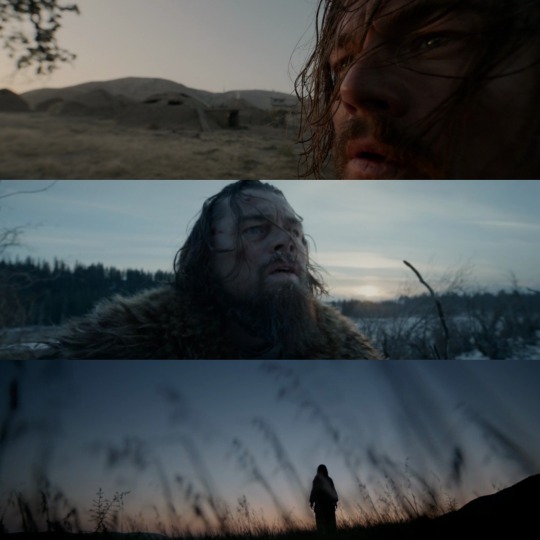
The Revenant (2015, Alejandro González Iñárritu)
02/11/2024
#the revenant#2015#alejandro gonzález iñárritu#mark l. smith#20th century studios#2003#Giulio Einaudi Editore#2014#Hugh Glass#18th century#19th century#1823#missouri river#Man in the Wilderness#1971#Remake#leonardo dicaprio#tom hardy#will poulter#domhnall gleeson#golden globe awards#British Academy of Film and Television Arts#academy awards#Academy Award for Best Actor#north dakota#Arikara#Pawnee people#grizzly bear
6 notes
·
View notes
Text
Marvel Studios' 'X-Men' Reboot Has a Writer!
Marvel Studios' 'X-Men' Reboot Has a Writer! @MarvelStudios #XMen
Mutant Mania has never been higher folks! And why wouldn’t it be. X-Men ’97 just wrapped, and proved that Marvel’s Merry Mutants are back and more popular than ever. In fact it was hands down, one of the best projects Marvel Studios has ever done since its inception in 2008. And later this year, we’re getting the return of Logan and Wade Wilson in Deadpool and Wolverine! We even got Beast in The…
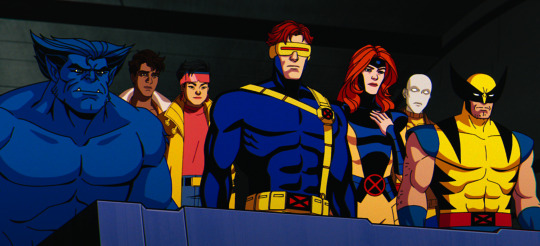
View On WordPress
#1990s#20th Century Studios#animated series#Deadpool#Disney#featured#Hugh Jackman#Marvel Animation#Marvel Cinematic Universe#Marvel Studios#Marvel Television#MCU#Movie Trailers#Mutants#Ryan Reynolds#Streaming#Super Bowl#Superheroes#Television#Trailers#Wolverine#X-Men#X-Men &039;97
2 notes
·
View notes
Text
May the 12th Be with You is such a waste. It has nothing to do with Mother's Day, and instead just continues The Simpsons' Plusaversary schlock of Disney IP bragging. My ★ review of May the 12th Be with You (2024) on Letterboxd:
#the simpsons#may the 12th be with you#disney#disney+#20th century studios#20th century animation#20th television animation#review#short review#letterboxd
2 notes
·
View notes
Text

Stella Stevens, whose real name is Estelle Caro Eggleston, is an American actress, producer, director, and model who began her career in 1959. Splendid blonde, Stella brought to the cinema an unusual appeal, which brought together freshness and casualty.
She got her first contract with 20th Century Fox, but dumped her at six months. After landing the role of "Appassionata Von Climax" in the film Li'l Abner (1959), she was hired by the producer Paramount Studios (1959-1963) and later by Columbia Pictures (1964-1968). For the role in the film "Most Promising Newcomer - Female", she shared the 1960 Golden Globe with Tuesday Weld, Angie Dickinson and Janet Munro. In 1960 Stella was Playboy magazine's Playmate of the Month for January, she also appeared in the magazine in 1965 and 1968. She was considered one of the 100 sexiest actresses of the 20th century. Throughout the 1960s, she was one of the most photographed women worldwide, along with Jacqueline Bouvier Kennedy, Marilyn Monroe, Brigitte Bardot, Ann-Margret and Raquel Welch. In 1962 she performed alongside Elvis Presley in Girls! Girls! Girls!. That same year, she also starred in Jerry Lewis's The Mad Professor. In 1970 Stella performed The Ballad of Cable Hogue alongside Jason Robards. In 1972, she appeared in the film The Adventure of Poseidon, by Irwin Allen, in the role of "Linda Rogo" (the ex-prostitute wife of the character played by Ernest Borgnine).
Throughout her career, she appeared in dozens of television shows, notably in the 1981-1982 season of the Flamingo Road series. Stella teamed up with the late Sandy Dennis in a women-oriented production of Neil Simon's The Odd Couple, playing the role of the unaltered.
She produced and directed two films: The Ranch (1989) and The American Heroine (1979).
#stella stevens#beautiful#beauty#actress#hollywood#star#classic#diva#vintage#classic hollywood#old hollywood
66 notes
·
View notes
Text
I don't know how to really express this except to come across as a "kids these days" scold, but so much of the criticism of queerness in Good Omens would simply not be a thing if kids these days watched more 20th century queer media. Or more complex indie queer media in general.
People seem to want a show that's like the straight stories they grew up with but gay. Or the gay fanfiction they grew up with. But that's not really the tradition it's coming from. First off the novel was released in 1990. Queer film classics of the time are Dead Poet's Society (1989) and Torch Song Trilogy (1988). The TV miniseries Tales of the City (1993) wasn't made until 3 years later and it was so far out there it never had a huge audience. Philadelphia (1993) is also 3 years out and was basically the first big studio queer film. The first fluffy queer Hallmark-style romcom wasn't until Big Eden in 2000, a full 10 years after publication.
Queer stories from the time it was written were about complex and often fraught relationships between people who the world was trying to force apart. There is an incredibly strong tradition in queer films of relationships with no guarantees they will work out both in the face of their personal baggage and the weight of the world. Take a film like Torch Song Trilogy that's about the two great loves of Arnold Beckoff's life over 9 years and how homophobia shapes them. Both externally (especially Allen) and internally like Ed struggling with his bisexuality and being terrified of being publicly out. Written and starred in by Harvey Fierstein, who identified as a gay man at the time and only came out as nonbinary last year.
The Boys In The Band (1968 play, filmed 1970 and 2020) was a monumental moment in Broadway history where finally there was a play about gay men in their own words where no one died and very strongly showed that homosexuality doesn't make people miserable but homophobia sure does. But that homophobia also throws their personal lives into constant turmoil and none of them are in happy relationships, although Hank and Larry are devoted to each other in their own fucked up way.
"Relationships are complicated and hard to make work and sometimes a struggle against the odds" is an aesthetic of classic queer film making. Partly it was influenced by the Hays Code (although independent films were not bound to it), partly influenced by the rampant queerphobia in society at the time that was inescapable. But it's also an aesthetic choice to resist the banal and unrealistic relationship depictions of straight media. There are actual stakes to the relationship. Queer people were actively resisting a world that said "Romance is seeing someone across the room and instantly falling in love with each other and little conflicts happen along the way but ultimately they're destined to be together and everything is happily ever after." Recall that "stalking as romance" was a completely inescapable trope in 1980s straight romance films, and every goddamn movie was being turned into a romance film.
So queer people in film and television when they can make what they please have a long tradition of saying instead "People don't always realize the feelings they've developed for a queer partner right away. They may have reasons for denying those feelings that are both a reflection of the cruelty in society and of their own insecurities. People struggle with where they belong and their relationships reflect that. Loving someone doesn't mean they don't also drive you crazy and you might fight with them constantly. But that doesn't negate the love or that feeling that even if things aren't okay, they're better with that person around. But maybe that person can't stay around. The world may be against you. And also maybe you don't just want that one person in your life. Soulmates is a very flawed model. Sometimes the strongest love is a struggle with yourself and the world and your person. You have to overcome yourself first. Happily ever after is a lie. You may be happy for a while, and hopefully for a long while, but everything ends. And you have to be ready to love again. Also your platonic bonds are just as important and life-altering as your romantic ones. Sometimes those platonic bonds include fucking if you want them to. Real life isn't a bunch of platitudes and world-altering moments, it's daily work to better yourself and the world around you. Especially when things just fucking suck. But also remember to have fun and fuck the haters. People who don't support you can eat rocks and you should yell at them more to shut the fuck up."
That is a fundamentally different outlook on what a "good relationship depiction" looks like. Personally, I thought I hated romance movies and then I started watching queer romance movies and discovered I love them and watch them all the time. Because it turns out what I hated was relationships being shown that had nothing at all to do with reality and privileged incredibly toxic ideals. Finally there was complexity, there were stakes, and there were people who had to truly want to be together enough to fight the world for it and not because they happened to be there. There were people actually talking out their problems and looking for resolutions. (And sometimes that resolutions was "I can't fucking deal with this bullshit anymore and I'm out.") For the first time it felt real.
I'm an aroace trans gay man. Nothing about relationships or being in relationships has come easy to me, and the whole paradigm of straight patriarchal romance depictions makes absolutely no sense to me. It's completely alien. Queer romance stories actually feel human.
And that's the tradition Good Omens is coming from, even as it's being retold in 2019-2023 and hopefully beyond. Gaiman's work has always been based in that queer media paradigm. (I've been remiss and daunted and haven't read Pratchett but from what I do know his work also seems to sit more in that world view.) It's a beautiful cinematic tradition and it's baffling to me that people would resist it instead of embracing it for being honest.
And that's when I turn into a crotchety old man complaining about the youth not connecting with the history of their beautiful culture and instead begging for assimilation into a shithole allocishet media landscape that doesn't actually want them except for their money and has nothing at all interesting or valuable to say. But it's very funny (annoying) to me when people claim Good Omens is someone against queer culture when it's so thoroughly bathed in the best of queer media's storytelling traditions and what people are asking for is straight media with the serial numbers filed off. Like, stop being boring please and know literally anything about the culture the adults in the room lived through and were influenced by. The world didn't begin in 2015.
EDIT: I also want to add that in straight media arcs are linear. Traditionally in queer media arcs are cyclical. Queer media very often depicts people going around in circles relearning the same lesson over and over as they inch towards it sinking in. But every time they go through the cycle they gain just a little bit more enlightenment and slowly move towards a better place. From the comments this is an immensely important distinction. People don't actually have cathartic moments where suddenly all their past bad programming is shed and they saunter forward a new person with none of their old baggage. In reality people fall into the same patterns over and over even though they have had every opportunity to learn better. "People magically get better" is a trope of straight media that's an outright and frankly dangerous lie. Again, Good Omens follows the queer tradition not the straight one and it's depicted 6,000 years of that cycle. The world didn't end, and the wheel keeps turning, as it always has and always will. That's so fundamental to queer storytelling traditions I forgot to even mention it.
#good omens#good omens season 2#good omens spoilers#go s2 spoilers#good omens discourse#queer media#queer history#discourse#I have been a crotchety old man against the youths since middle school to be clear#if you don't know where you've been you have no hope of knowing where you should go next#I didn't sit all the way through deeply homophobic Brokeback Mountain or Tár just to hear people complain that honest rep is bad rep#This is also why I'm a critchety old man about most Critical Role Shadowgast haters#Liam and Matt have not only watched but copiously reference older queer media and Shadowgast is so clearly that tradition
428 notes
·
View notes
Text
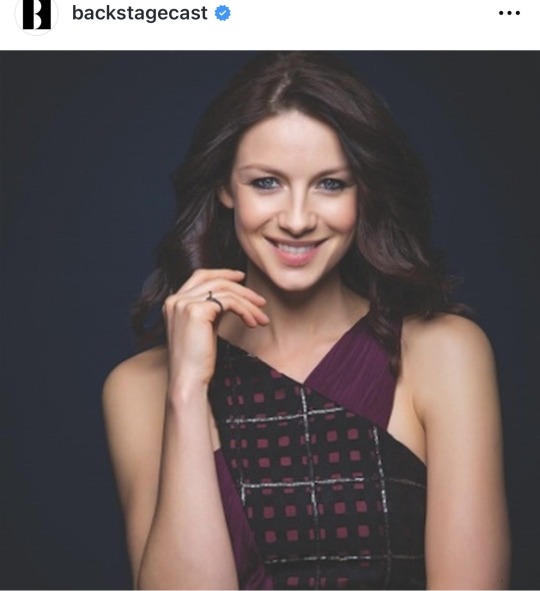

Instagram
•••••
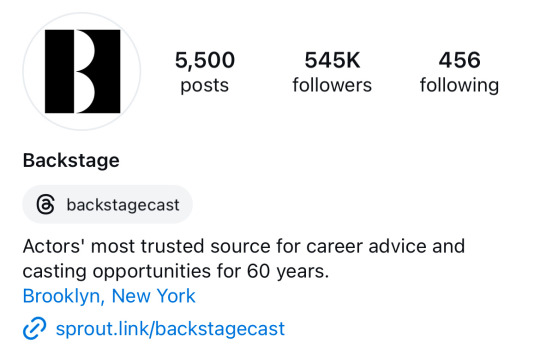
•••••
WHAT THE STARS ARE SAYING
Check out why so many famed actors use Backstage
Trusted since 1960
Founded in 1960, Backstage has a storied history of serving the entertainment industry. For over 60 years Backstage has served as a casting resource and news source for actors, performers, directors, producers, agents, and casting directors.
Over that time, Backstage Magazine has also appeared on numerous TV shows, such as “Mad Men,” “Entourage,” “Glee,” “Oprah,” NBC's “Today” show, Comedy Central's “@Midnight”, NY1's “On Stage,” and “Saturday Night Live,” as well as multiple mentions on shows like “Inside the Actor’s Studio,” “Girls,” and appearances in films such as “13 Going on 30,” the Farrelly brothers' “Stuck on You” and Spike Lee's “Girl 6,” and even a mention in Woody Allen's short-story collection “Mere Anarchy” and Augusten Burroughs' novel “Sellevision” – and Backstage has received accolades from multiple Academy Award-, Emmy-, and Tony-winning actors and directors. (Plus, the hit musical “The Last Five Years” even includes Backstage in its lyrics: “Here's a headshot guy and a new Backstage / Where you're right for something on every page.”)
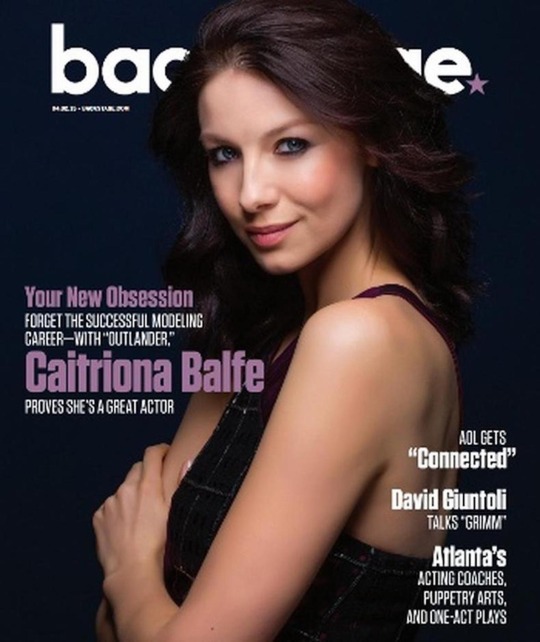
CAITRÍONA BALFE
ACTRESS
"I still get Backstage emails 'cause I still subscribe to Backstage. [Backstage is) kind of the Bible in the beginning, which is amazing. Samuel French and Backstage go hand in hand, you know? You go there for your plays when you're in classes, and then you get your Backstage."
Backstage 1
•••••
Brian’s Note: The following story originally appeared in April 2015. Most recent update is December 2020.
The Gorgeous Determination of Caitríona Balfe
Caitríona Balfe is on the move. That's been true most of her adult life— especially the 10 years she was modeling for Victoria's Secret, Dolce & Gabbana, and others—but as she sits on the rooftop patio of a West Hollywood hotel in mid-March, she mentions that she's pulling up stakes from Los Angeles.
"It just feels silly to have an empty place for 10 months until I figure out what I'm doing with my life," the Irish-born actor says. "I've rented the same place for the last four years and now I have to give it up." Her apartment is being razed to put in condos, but her departure from L.A. is extra poignant considering this is the city where Balfe journeyed when she decided to put aside that successful modeling career and focus on the vocation she'd always wanted: acting.
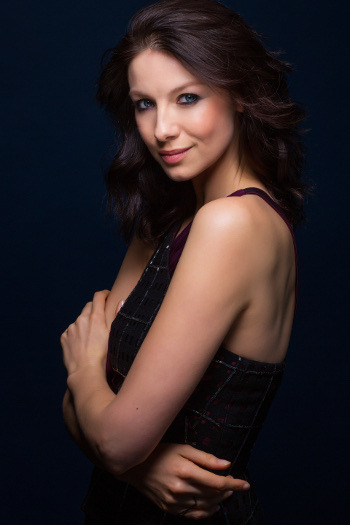
Photo: Luc-Richard Elie
"I've moved so much since I was 18," she says. "I mean, l've lived so many places. New York, I lived in for almost eight years [while modeling], and that's been the longest of anywhere since I left Ireland. But L.A. is where I came and said, 'OK, this is what I wanna do with my life.' "
She refuses to think of her move as a permanent one, though. "I'll be back," she declares, "but it feels really sad. My little apartment, it's got so many memories."
Balfe's sadness is no doubt mitigated by the fact that part of her need to move is due to the precipitous rise in her fortunes. She'll soon be flying to Scotland to shoot the second season of "Outlander," which returns to Starz April 4 to conclude Season 1.
When last we saw Balfe's Claire, the resourceful British nurse who comes home after World War |I only to be inexplicably teleported into the 18th-century Highlands, she was half-naked with a knife to her breast. Don't worry: Claire will get out of that scrape, but more perils await-to say nothing of the emerging multi-era romantic triangle developing between her, the Scottish warrior Jamie Fraser (Sam Heughan), and her 20th-century husband, Frank Randall (Tobias Menzies), who wonders where she's gone.
Based on the much-beloved Diana Gabaldon novels and developed for television by "Battlestar Galactica" rebooter Ronald D. Moore, "Outlander" is an ostensibly lush period-piece-within-a-period-piece drama that's consistently richer and thornier than its romance-novel trappings suggest. And much of the credit goes to Balfe, who had managed small parts in films such as “Super 8” and “Now You See Me” before landing the central role in this adaptation.
In person, Balfe is far less imposing than the steely Claire, who has to weather the dangers of being a woman in sexist, violent Scotland in the 1740s. Cast late in the preproduction of “Outlander”—Moore has mentioned in interviews how hard it was to find the right Claire—she didn’t have time to consider what the role would do to her life. “I’m so bad on social media," she confesses on this warm afternoon, nestled underneath a cabana. "I had set up an account on Twitter maybe a year or so before I got this job and had, I thought, a lot of followers — 250 or something, and most of them are my friends. Within about a month or two, it was thousands of people — and my phone, I didn't know how to turn off the alerts, so it was just going all the time. That was the beginning of the awareness."
Growing up in the small Irish community of Monaghan, Balfe had considered acting from an early age. ("I was devastated that I wasn't a child actor," she says, smiling. But after traveling to Dublin to study theater, she changed course once she received an offer to model. It wasn't a secret passion of hers, but who turns down a trip to Paris? "My parents felt that I should finish college," Balfe recalls, "but l'm slightly headstrong, so l took their advice and I completely ignored it."
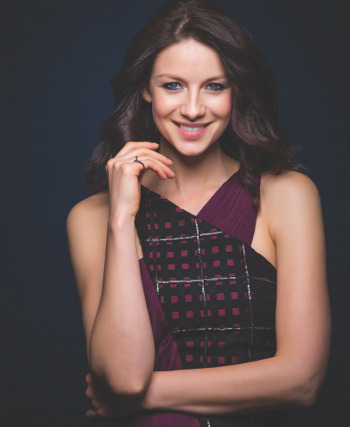
Over the next decade, she lived in France, Italy, Germany, and Japan, her modeling inexperience hardly a detriment. "You'd be amazed how little information or training goes into it," she says. "When I first arrived in Paris, I was told to take a bus to the office. I left my suitcase — I barely spoke any French — and someone took me across the street, helped me buy a Carte Orange. They printed out five addresses that I had to go to that day, and then they sent me off." She still remembers at 18 riding the subway alongside 16-year-old aspiring Russian models, who knew no French or English, homesick and sobbing their eyes out. "That was just the way it was," says Balfe. "You become pretty tough. When I went to Japan, it was similar: They would drive you to their castings, but the minute you got a job, it would be like, 'Here's an address, here's a map. Good luck.' They don't have signposts in English in Japan, so the map and the address are not always very helpful."
Hear Balfe recount her early misadventures in modeling and you can't help but think of Claire, who's equally thrown to the wolves once she arrives in the 18th century amid people wary of the English in general and assertive women in particular. "Honestly, l've been in so many situations in my life where you just are completely displaced," Balfe says. “You have to adapt very quickly and figure it out. I definitely think that informs Claire a lot. It helped me understand her."
Did moving to Paris at such a young age teach Balfe that she can cope in any circumstance? "I think I didn't really realize that until many years later," she replies. "I have a great knack of not thinking about things and just going for it. You learn the hard way sometimes that you're able to get through, but sometimes it's quite tough when you're in a situation where you don't know anyone and you're trying to find your way around cities. But if an opportunity presents itself and it seems like a good idea, l'm just like, 'OK, let's do it, then I'll figure it out.'”
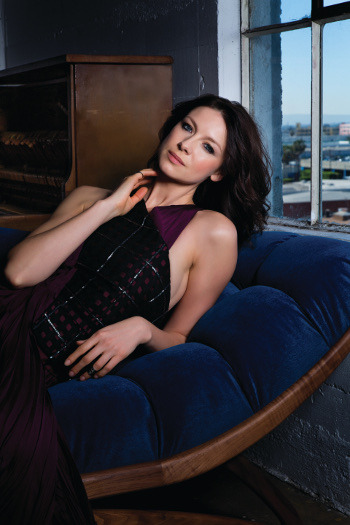
The decision to reconnect with her acting ambitions was conducted just as boldly. Ready to quit modeling, she moved to Los Angeles because a writer she was dating lived there. He was the only person she knew, but she had read a Vanity Fair interview with Amy Adams in which she said she trained with Warner Loughlin. "I could walk to that place from my ex-boyfriend's house," she says, "so l was like, 'Well, I'm gonna go there because I can't really drive. I started from scratch. I didn't have any managers, I didn't know any agents, I hadn't acted in almost a decade." But she just kept taking classes, moving from Loughlin to the studios of Sanford Meisner and Judith Weston. "I think when I first got here, I had a nice little air of delusion: 'It's gonna work out,'" she says with a laugh. “You just don't know how."
And then came "Outlander." By email, Moore admits that he didn't know Balfe's work until her audition tape came unsolicited to his office from her agent. Once she was chosen for Claire, he made it clear how demanding the job would be. “I told her in our first meeting that this was going to be an even bigger responsibility and workload than the normal TV lead," he writes. "Because the story was being told from Claire's point of view, Cait was going to be in every scene, every day for months, which is an extraordinary amount of work, far beyond what most actors are ever asked to do."
Moore's warning didn't faze Balfe. Writes Moore, "After she met with the president of Starz... and it was clear that she was going to land the role, I walked her to the elevator and just before the doors closed on her, I said 'Your life is about to change forever,' and she gave me a grin that was both thrilled and slightly nervous. I never saw her hesitate after that."
She's never hesitated before. As Balfe prepares to say goodbye to L.A. (for now, she thinks back to her early days in the city, trying to convince casting directors that she was more than just a model. "I went on many, many, many, many auditions that were Hot Girl No. 2 — you wanna shoot yourself," she says, laughing. "But, you know, I'm very lucky that l was even getting those auditions in the beginning. And it toughens you up. At least for me, to have that fuel to prove people wrong—it definitely spurs me on and makes me wanna work harder." Then she smiles conspiratorially. "And shove it to them."
Backstage 2
Remember… I told her in our first meeting that this was going to be an even bigger responsibility and workload than the normal TV lead. — Ronald D Moore
#Tait rhymes with hat#Good times#National Actors Day#8 September 2024#Backstage#April 2015#Story last updated December 2020#Instagram
40 notes
·
View notes
Text

The first Oscars. Photo: Courtesy Margaret Herrick Library, Academy of Motion Picture Arts and Sciences The Academy Museum of Motion Pictures in Los Angeles announced on Monday that it will make changes to its new exhibit about the Jewish roots of the Hollywood film industry after it was criticized by Jewish activists and members of the entertainment industry. The museum said in a statement to the The Hollywood Reporter that it “heard the concerns from members of the Jewish community,” takes the concerns “seriously,” and is ”committed to making changes to the exhibition to address them.” “We will be implementing the first set of changes immediately — they will allow us to tell these important stories without using phrasing that may unintentionally reinforce stereotypes. This will also help to eliminate any ambiguities,” the museum added, before stating that it is “convening an advisory group of experts from leading museums focused on the Jewish community, civil rights, and the history of other marginalized groups to advise us on complex questions about context and any necessary additions to the exhibition’s narrative.” “We are deeply committed to telling these important stories in an honest, respectful, and impactful way,” the museum said in conclusion. The Academy Museum of Motion Pictures opened on May 19 its first permanent exhibition, titled “Hollywoodland: Jewish Founders and the Making of a Movie Capital.” The exhibit highlights the “Jewish founders of the Hollywood studio system” and “tells the origin story of filmmaking in early 20th-century Los Angeles, spotlighting the impact of the predominately Jewish filmmakers whose establishment of the American film studio system transformed Los Angeles into a global epicenter of cinema.” Jewish activists and members of the film and television industry criticized the exhibit for its negative portrayal of Jewish studio founders and filmmakers, claiming that the exhibit focused more on their flaws than their achievements. The critics accused the exhibit of promoting “antisemitic tropes” and attacked the museum for describing the Jewish filmmakers with words like “oppressive,” “harmful,” “predator,” and “tyrant.” The museum announced changes to “Hollywoodland” on Monday before an open letter published by a group called United Jewish Writers further condemned the exhibit. “While we acknowledge the value in confronting Hollywood’s problematic past, the despicable double standard of the ‘Jewish Founders’ exhibit, blaming only the Jews for that problematic past, is unacceptable and, whether intentional or not, antisemitic,” read the open letter. “We call on the Academy Museum to thoroughly redo this exhibit so that it celebrates the Jewish founders of Hollywood with the same respect and enthusiasm granted to those celebrated throughout the rest of the museum.” United Jewish Writers also claimed that the exhibit is “the only section of the museum that vilifies those it purports to celebrate.” The open letter was signed by more than 300 Jewish members of the entertainment industry, including actor David Schwimmer and showrunner Amy Sherman-Palladino.
Maybe this time, have some movie-loving, non-Jew-hating, non-ideologues do the writing. And don't forget that originally, the Jewish founders of Hollywood were completely left out of the Museum's story.
#academy museum of motion pictures#antisemitic tropes#double standards#jewish founders of hollywood#hollywoodland#jewish founders exhibit#jewish roots of the hollywood film industry
49 notes
·
View notes
Text

Disney Blasts Solar Opposites For A Sixth Season Order
Disney Streaming Services has renewed Solar Opposites for a Sixth Season ahead of it's fifth season premiere on Hulu and Disney+.
The series has been one of the most streamed series at Hulu and Disney+, Disney considers the show one of the pillars of adult animation for the 20th Century Studios brand.
#Solar Opposites#Mike McMahan#Josh Bycel#20th Century Studios#20th Television Animation#Hulu#Hulu Originals#Hulu Original Series#Hulu Original Animated Series#Star#Star Originals#Star Original Series#Star Original Animated Series
64 notes
·
View notes
Photo

TV Guide - July 4 - 10, 1964
Raymond William Stacy Burr (May 21, 1917 – September 12, 1993) Actor, primarily known for his title roles in the television dramas Perry Mason and Ironside. He was prominently involved in multiple charitable endeavors, such as working on behalf of the United Service Organizations.
Burr emerged as a prolific television character actor in the 1950s. He made his television debut in 1951, appearing in episodes of Stars Over Hollywood, The Bigelow Theatre, Family Theater and the debut episode of Dragnet. He went on to appear in such programs as Gruen Playhouse, Four Star Playhouse, Ford Theatre, Lux Video Theatre, Mr. and Mrs. North, Schlitz Playhouse of Stars and Playhouse 90
Burr moved from CBS to Universal Studios, where he played the title role in the television drama Ironside, which ran on NBC from 1967 to 1975.
After Ironside went off the air, NBC failed in two attempts to launch Burr as the star of a new series. In a two-hour television movie format, Mallory: Circumstantial Evidence aired in February 1976. In 1977, Burr starred in the short-lived TV series Kingston: Confidential. He took on a shorter project next, playing an underworld boss in a six-hour miniseries, 79 Park Avenue.
He won two Emmy Awards, in 1959 and 1961, for the role of Perry Mason, which he played for nine seasons (1957–1966) and reprised in a series of 26 television films (1985–1993). His second TV series, Ironside, earned him six Emmy nominations and two Golden Globe nominations. (Wikipedia)\
Erle Stanley Gardner (July 17, 1889 – March 11, 1970) was an American lawyer and author. He is best known for the Perry Mason series of detective stories, but he wrote numerous other novels and shorter pieces and also a series of nonfiction books, mostly narrations of his travels through Baja California and other regions in Mexico.
The best-selling American author of the 20th century at the time of his death, Gardner also published under numerous pseudonyms, including A.A. Fair, Kyle Corning, Charles M. Green, Carleton Kendrake, Charles J. Kenny, Stephen Caldwell, Les Tillray and Robert Parr. (Wikipedia)
40 notes
·
View notes
Text
David Zaslav Vs. The Warner Bros. Mob
Ever since Warner Bros. Discovery has merged two years ago,David Zaslav’s horrible cost-cutting decisions and anti-animation views has badly impacted and severely hurt the company(not Warner Bros.,but Warner Bros. Discovery) since he managed to shut down Rooster Teeth,burlugeoned Cartoon Network’s reputation and legacy by shutting down it’s original headquarters building in Burbank last year,is now deleting many of CN’s most notable shows off Max(except for Powerpuff Girls and Courage),made CN less mainstream and gave some of it’s hours to Adult Swim,shut down it’s online website,and CN now airing few and farther between shows produced by CNS and WBA,imported shows(both original and preschool),shows produced by Hanna-Barbera Studios Europe,and reruns of past shows,threw a few projects/shows that were made or shelved (such as a few CN shows such as Infinity Train,Close Enough,and Victor and Valentino,Coyote Vs. ACME,Scoob:Holiday Haunt,Bye Bye Bunny,and The Cartoon Cartoons Program)in the WBD vaults and cancelled a lot of films and shows in production such as DC’s Batgirl,the Scooby-Doo Hex Girls Movie,Pibby:Apocolypse,and the DC animated Batman Beyond movie,has the company engage in tax write-offs and did a number of layoffs,doubled down on WB Games,mistreating animation and famous IP’s like Looney Tunes and Scooby-Doo,making CN and WB having weak anniversaries with CN’s 30th anniversary in 2022 and WB’s 100th Anniversary in 2023, made Cartoonito a one-hour block on CN now,purged a lot of shows off HBO Max back in Augest 2022,and other shakeups and decisions he’s made at the company.
Now,worse with Warner Bros. Discovery no longer renewing its deal with Sesame Workshop for any more new seasons of Sesame Street on HBO and Max and the long-running kids series is finding a new home now(at least it still had PBS) and Max now attempting to remove not only more CN shows off it’s service,but almost the rest of the animated shows off it’s service next year and 2026(such as classic Looney Tunes shorts,Tom & Jerry,Scooby-Doo,South Park,The Flintstones,Powerpuff Girls,and more),making Max more like Minimum than ever,my hatred for Zaslav has reached full infinity now that I decided to finally do this drawing.
Now,in this animated colored pic,here is David Zaslav,now in fear and holding his bag of money,now being chased by an angry mob of WB characters,who are now enraged at Zaslav for ruining the company’s reputation,ruining both Max as a streaming service and Cartoon Network as a channel, and nearly hurting and harming Warner Bros. as a studio and entertainment company that is meant to entertain the world since 2023,not be anti-art and cancel film projects(and the company isn’t the studio who does storytelling since other studios like Universal,Disney,MGM,Sony,20th Century Studios,A24,Netflix,and Paramount have done films and television as well). I hope Zaslav pays for what he had done and deserves to be beaten down and punished by the mob for good.
Also,to save Max and put a lot of cartoons on this streaming service,please support,sign,and share my petition to make it an animation heaven again and make Zaslav reconsider.
https://www.change.org/p/get-wbd-to-relaunch-cn-website-and-put-a-lot-of-cartoons-back-on-max-formally-on-hbo-max/dashboard?source_location=user_profile_started
at least The Day The World Blew Up:A Looney Tunes Movie is safe now with Ketchup Entertainment distributing it to theaters next year in February,DC is starting a new universe with James Gunn starting with 2025’s Superman launching it next year,I praise WB Animation/Cartoon Network Studios President,Sam Register for still being respectful to animation, and Bill Damaschke is bringing back Warner Animation Group,now as WB Pictures Animation on the big screen starting with an CG animation adaptation of Dr. Suess’ The Cat In The Hat releasing in 2026. Also,WB will have new plans for the Looney Tunes franchise in 2028,I hope more CN classics and originals will get complete series DVD releases in the future(including ones being brought out of the WBD vault like Infinity Train and Victor and Valentino)like they’re having with Regular Show next year in February,and Scooby-Doo is rebooting itself with Go Go Mystery Machine next year.
I hope by next year,I just wish David Zaslav would finally step down as CEO and leave the company for good,I can’t stand him running it anymore and making anymore bad decisions,since Disney CEO,Bob Iger is stepping down in 2026 and having a successor take his place.
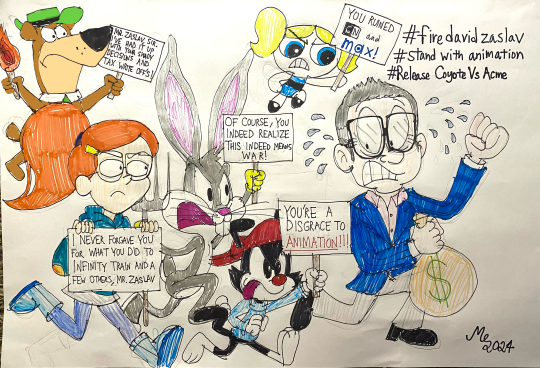
#warner bros#cartoonnetwork#david zaslav#bugs bunny#the powerpuff girls#animaniacs#infinity train#jellystone#yogibear
11 notes
·
View notes
Note
hihi! your rb with the tags about your profession had me intrigued and I wanted to ask, what DID kill the Hollywood system? if you don't mind me asking >u<
HI HI HI HEHEHE first of all i hope you’re doing well!!! seCONDLY OMGGG thank you for indulging me waaaaah i love talking about golden age/classical hollywood and the studio system!!!
beware: i rambled on and on below the cut >.< apologies for the mini essay in advance waaah
OKAY SO. first, a little context. the classical hollywood studio system originally utilized a practice called ‘vertical integration’, which basically means they owned and operated ALL channels of production, distribution, AND exhibition—aka, they controlled literally everything in regards to the films they made, which was like 90% of american filmmaking at the time. this, naturally, made it quite difficult for any film that wasn’t a film made by the Big Five (warner bros, paramount, 20th century fox, RKO, and MGM) or the Little Three (columbia pictures, united artists, and universal) to be screened at a theatre, because the studios owned a decent chunk of the theatres.
furthermore, the theatres the big studios DID own always got first run of their films, meaning that their movies were exclusively screened at the theatres they owned first, then were passed off to second run, third run and fourth run theatres. it’s important to note here that the film prints being distributed and passed around theatres were the same all throughout a film’s run—so by the time a print reached a fourth run theatre, the film stock was all scratched up and low quality. who wants to go watch that? (no one! audiences flocked to the first run theatres owned by the studios!).
the antitrust case between the supreme court and paramount pictures (aka ‘the paramount decrees’) was the first, and heaviest, nail in the coffin of the studio system. the paramount decrees did two things. first, they forced studios to stop a practice known as block booking. block booking was a practice where theatres not owned by the big studios were forced to buy a huge block or batch of films in advance. usually, these films included one A-list film and then a bunch of B-movies and other less desired films. second, they forced studios to cease owning theatre chains, which allowed for indie directors to begin screening their films, AND it allowed for more international films to be shown (which in turn helped break down the production code & replaced it with the ratings system).
this began the end of the system! it was then further impacted by consumer culture, car culture, and suburbia. after world war two, many people moved out of the city and into the suburbs, where they began to start families. car culture was booming and it was hip to have a car that you could use to commute to work (from the suburbs into the city!). disposable income was abundant, and many families were buying fancy new appliances for their new suburban homes—including televisions.
it’s a common misconception that TV killed the studio system. it was, in actually, only one of several nails in the coffin. television at the time was pretty crummy; it was low quality, the screens were small, and it only had about three channels (not to mention studios began allowing television networks to begin screening older films that no longer ran in theatres). but evidence proves that moviegoing attendance had fallen drastically several years before televisions became a fixture in the home. to combat TV and capitalize on car culture, studios began erecting drive-ins, to little avail!
anyway, i could go on and on and on but basically, in a nutshell, those were the handful of things that broke down the classical studio system and gave way to ‘new hollywood’…which then gave way to the blockbuster.
#there’s also like;; the HUAC trials which impacted up the studio system as well#anyway i hope all of this makes sense!!! i tried to convey it as concisely as possible HAHAHA#i have a tendency to go into way too much detail when talking about these things#(which i think is where the unintentional pretentiousness comes in; i just want to share every lil bit of knowledge and info i know!!)#the studio system is fascinating and pretty sickening tbh#i believe we are currently living through more hollywood history atm#the north american movie industry is pitiful right now#it needs a revival#*i* am hoping for a second ‘new hollywood’ to come about but#we’ll see#they need fresh blood!!! new ideas!!! stop letting disney 1. control everything and 2. rehash the same shit over and over again!!!#aaaah okay ANYWAY LMAO#thank you again for indulging me :3#i hope you had a lovely tuesday and i hope the rest of the week is kind to you sweet friend!! <333#inky.bitti#clari gets mail
11 notes
·
View notes
Note
hey nana, just had this thought. how do you think chan would react for seeing you braless? like hear me out. it's just one month since you're relationship and you're too busy to spend time together or be intimate with eachother. recently you've had long 2 weeks going out on many occasions, wearing all tight formal attires. and finally both of you had a leave, deciding to spend it with him. you're tired as hell and even wearing bra made you feel so suffocating, so you decided to remove it and wear nothing but tank top. how do you think he'd react?
(ignore this if i made it seem uncomfortable or anything. anyways have a great day, thank you)

(warning: suggestive, heavy making out, yearning, insinuates sex)
Chan likes you, like really likes you. That's why he tolerated all the time apart. After all this waiting time for you to come around, you've finally been able to define the relationship. It didn't take long for him to count the reasons why it took you so long in the first place.
The job forces you to be social, creating countless networking opportunities, many of which occur late at night during weekdays and weekends. Safe to say you haven't had a lot of time together, but for the first time in a while, you had a free weekend, and who better to spend it with than your boyfriend.
He smells just as good as you remember. His embrace was warm and welcoming like a warm cup of your favorite herbal tea and you can't help but inhale him the moment you arrive. "I missed you so much."
"I missed you too. This weekend was all I was looking forward to this week. I was starting to think I dreamt we got together a month ago."
You chuckle into his chest and pulled away briefly to admire his features, "Definitely not a dream. I'm all yours. I can't wait to spend all weekend with you. Speaking of which, I made us some popcorn and later we can maybe door dash some takeout? I am really sick of tiny little appetizers that would only really fill up an ant."
Chan's giggles were soft and light, a fluttering feeling in your stomach as his hand comes up to pet the top of your head. "All the food you want. Ready to let it all go with you."
You were relieved to hear that and press a kiss to the tip of his nose before guiding him to the couch and getting him comfortable before you break out the snacks. He put on a little comedy action for you both to watch, remembering how you said that was your favorite genre, and grins from ear to ear seeing you return with a tray full of movie theater style treats.
You scoot yourself close to him, lacing your hand through his, testing out the intimacy levels as the familiar 20th Century studio introduction sounds off on Television. Early on, you're already enjoying yourselves, laughing, making your own small inside jokes, and reenacting some of the lines already told on screen. It was nice and relaxed for once. at some point in the night, Chan decides to put his arm over your shoulders, pulling you in closer. You flush at the closer proximity but are reminded by the jabbing feeling of the underwire confining the flesh mounted on your chest and can't help but shrug him off. Chan festers up this guilty, thinking maybe he went too far. "D-did I make you uncomfortable? Sorry."
"Oh, no. It's just, this bra sucks. I was wearing it for errands earlier and should've taken it off. Give me a sec."
You scoot over to the side, giving yourself space. You part the buttons from your cardigan and you tug it right off, your shoulders and arms exposed. Chan gets faint blush realizing what you're about to do and before he could suggest giving you some privacy, you do that magical thing people with breasts do and slip it right from the tank top, revealing a cute nude patterned bra in your grasp he then can't help but notice your breasts naturally dropping from the power of gravity, your nipples plump and poking through the thin material and automatically, he crosses his legs, unable to meet your eyes.
"I'm just gonna put this away. I'll be right back. Keep watching the movie."
You leave him briefly to be alone in his thoughts, thinking how probably soft they would be in his hands or how warm they are pressed up against his face. He twitches in his sweatpants, clenching his legs tighter against each other. "Dead puppies, burning buildings, the Holocaust."
He mumbles to himself distasteful, horrific, and unpleasant things, begging and pleading for this boner to go away. He would have nothing more than to have a relaxed night after all the tiring work both of you have gone through these past few weeks but it had a mind of its own. He had no choice but to use to throw a pillow on his lap, seeing as you've already come back, still in only a tank top nonetheless. You take his arm and throw it back on your shoulders like nothing's happened, attention back on the movie, while Chan could think of anything but the movie.
You notice the tension in his body all too quickly, watching how hard he clutches that pillow or how he blatantly avoids contact with your chest. You grin to yourself, thinking your little act has caused him to malfunction. You draw lips closer to his ear, hearing him gulp the moment your breast brushed up against his arm, and whispered, "Something wrong?"
To which, he ferociously shakes his head, tight-lining his smile no less awkward than you expected him to. You then take your hand to cup the side of his face and press your lips to his, moving it gentle and slow. He eagerly reciprocates, kissing your lips with the vigor of a horny teenager but the hesitancy of a respectful partner, parting as soon he got a taste and returning to not overstepping invisible boundaries he's set for himself, leaving your kiss sweet but curt. You couldn't have it. You reconnect your lips as soon as possible and even run your fingers through his undone hair, unwilling to let go. Chan takes the hint soon enough and comes undone from your touch, hands falling to your hips and pulling you towards him.
Your body heats at the raw intensity Chan unleashes, crawling on top of his lap and bordering either of his sides with your knees, pushing your chest back against him and feeling his moans vibrate throughout your mouth. His hands roam through your body, tracing over your shape, drawing it out in his head, and in a second take away that control to cup your hands over his against your breasts, encouraging him to feel you, savor you, want even the most intimate part of you and how can he say no?
He fondles them gently in his hands, clenching and unclenching to grasp their weight and pillowy sensation, all for him to have them pool between his fingers, teasing your perky nipple between the crevices. You softly whimper, grinding against the constricted snake in his pants like your own personal toy, feeling him grow only bigger every passing second. Chan grunts in every break of the kiss, containing himself as humanly possible, before breaking your liplock and looking into your eyes, a look for approval. "Bedroom?"
"No," You smile shaking your head, "I want you to take me here, on the couch."
#svthub#chan fluff#Dino smut#seventeen smut#seventeen x reader#dino fluff#seventeen fluff#lee Chan#Dino#seventeen#Chan#seventeen imagines#seventeen fanfic#seventeen scenarios#lee Chan smut
348 notes
·
View notes
Text
Matt Bomer, Nathan Lane to Star in ‘Golden Girls’-Like Hulu Sitcom From Ryan Murphy and ‘Will & Grace’ Creators
It’s not “The Golden Girls,” but get ready for a new, even gayer roommate sitcom.
I can exclusively report that Matt Bomer and Nathan Lane are set to star in “Mid-Century Modern,” a multi-cam series for Hulu executive produced by Ryan Murphy and created by “Will & Grace’s” Max Mutchnick and David Kohan.
Sources reveal that Bomer will take on the ditzy Rose-like character, played by Betty White in the original “Golden Girls,” with Lane taking on the Dorothy (Bea Arthur) of the bunch. Linda Lavin will play Lane’s mother, a la the original Sophia.
The new series will be set in the gay mecca of Palm Springs. James Burrows is directing the pilot. Mutchnick, Kohan, Burrows, Lane and Bomer will also exec produce. 20th Television is the studio.
“The series follows three best friends — gay gentlemen of a certain age – who, after an unexpected death, decide to spend their golden years living together in Palm Springs where the wealthiest one lives with his mother and a naked Gen Z housekeeper,” Hulu says in a release. “‘Mid-Century Modern’ stars Nathan Lane as Bunny Schneiderman, Matt Bomer as Jerry Frank, and Linda Lavin as Sybil Schneiderman, Bunny’s mother. A successful businessman with one foot in retirement, Bunny is forever in search of love, but he first has to be convinced he’s worthy of it. Like her son, Sybil’s strengths are her weaknesses: wise, caring, and iconoclastic – which sometimes means she’s critical, smothering and amoral. Jerry left the Mormon Church and his marriage in his early 20s after his wife informed him and the rest of the congregation that he was a homosexual. Now a latter-day saint in the literal sense of the term, Jerry is pure of heart. He is also hard of body and soft of head.”
From Variety
I can't wait for this 😍
18 notes
·
View notes
Text
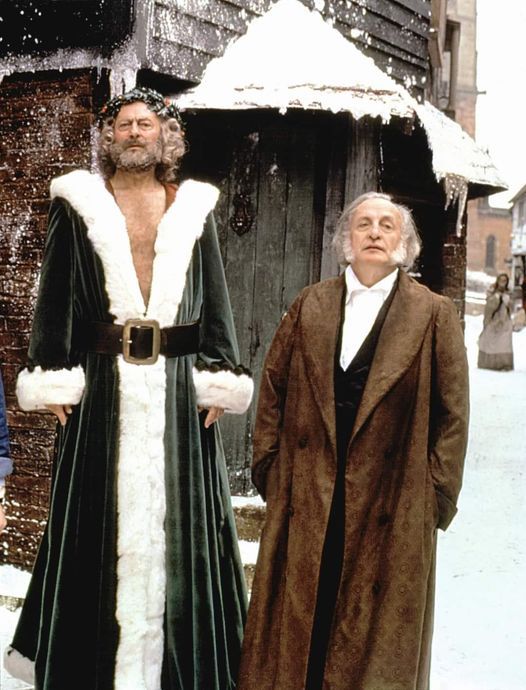
A Christmas Carol (1984) George C. Scott and Edward Woodward (one of my favorite versions - Fred, YDI)
This is probably the only version of 'A Christmas Carol' in which Scrooge wears dress pants with a dress shirt, vest, and smoking jacket instead of his nightshirt, slippers, and cap. Rumor has it that George C. Scott openly reeled at the very thought of portraying Scrooge under such conditions, especially in an English winter. In the book, Scrooge wears his shirt, pants, vest, dressing gown, and slippers. Scott's clothing is very close to the book.
Although this movie was made for television, it was released theatrically in the United Kingdom in November 1984.
Many versions of A Christmas Carol depict Scrooge as beginning to understand his mistakes by the end of his time with the Ghost of Christmas Present. However, this is one of the few versions that makes a point of showing that Scrooge does not accept his mistakes until he spends a good amount of time with the Ghost of Christmas Yet to Come. As an example, when he is deserted by the Ghost of Christmas Present, Scrooge sits down and states "What have I done…to be abandoned like this."
This movie was filmed on location in Shrewsbury, Shropshire, in the English Midlands. It originally aired on the American television network CBS on 17 December 1984, and was released theatrically in Great Britain.
The movie has run in syndication on local American channels since it debuted in 1984, and was released on VHS in 1989 (in the UK) and to DVD in 1999. This was because Scott himself (and later his estate through Baxter Healthcare, to whom the Scott family donated their copyright) owned the rights to this film. On 25 November 2007, it returned to national television on AMC for the first time since its debut, and the network continues to show it each December under license from the Scott estate and 20th Century Studios/Walt Disney Television (the latter's distribution rights the result of their owning the video rights). In 2009, the Hallmark Channel also ran the movie soon after Thanksgiving. It remains among the most beloved of the several adaptations of A Christmas Carol.
The fade outs for commercial breaks (as seen on television airings and original VHS releases) perfectly broke the story up into the five 'staves' as per Dickens' original novel (Marley's Ghost/The First of the Three Spirits/The Second of the Three Spirits/The Last of the Spirits/The End of It). However, these have been edited out for the more recent DVD and Blu-ray releases.
28 notes
·
View notes